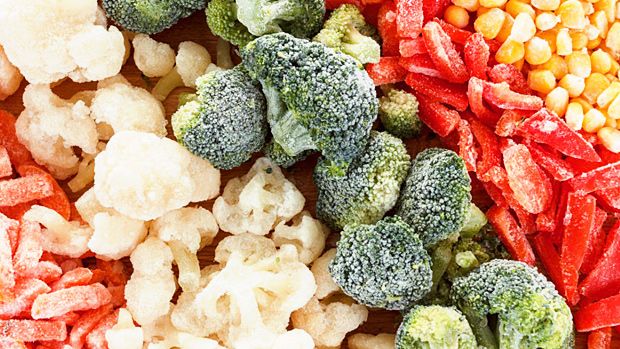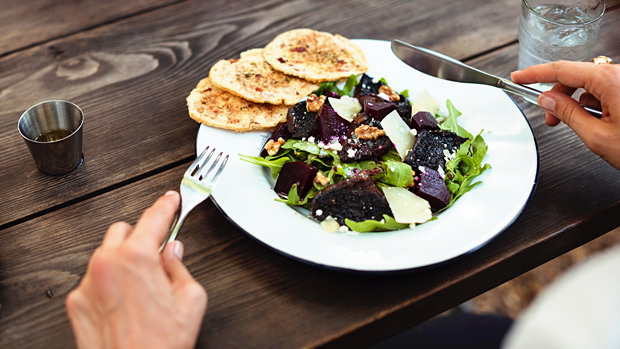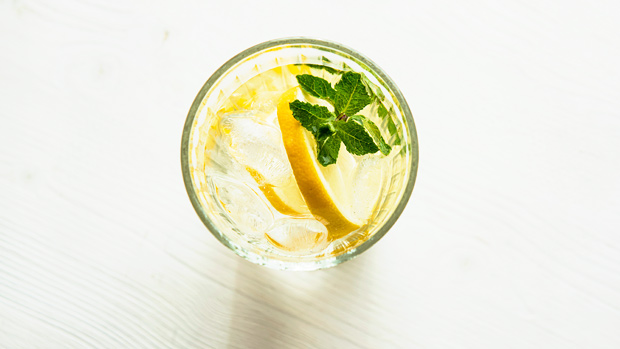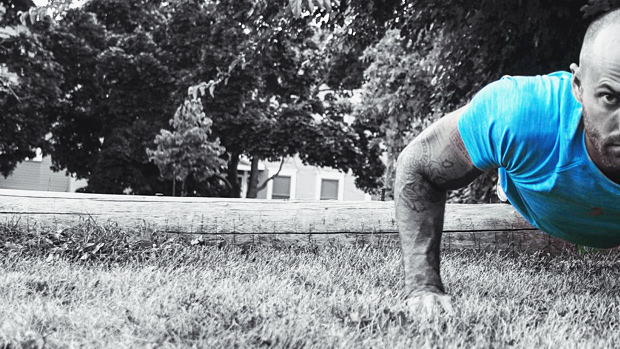Challenge Us!
We asked several T Nation experts and pros to give us a one-week challenge that will improve our diets. Here's what they had to say.
Mark Dugdale – IFBB Pro Bodybuilder
Eat almonds and drop the sugar.
Start your day by eating three-fourths of a cup of almonds – ideally sprouted and dry roasted yourself. What you'll gain here is better blood sugar management throughout the rest of the day. Far too many bodybuilders start off their day with a massive carb meal, leaving their pancreas working overtime and their brain fogged by noon.
Second, drop all sugar. That means zero added sugar, and I'd also eliminate fruit. Don't panic, it's only 7 days. If you have a sweet tooth you'll curse me by day three, but stick it out for 7 days and you'll begin to see that life without sugar isn't so bad. Cravings will subside and cognitive ability will improve. Mark Dugdale
Lonny Lowery, PhD – Exercise Physiologist and Nutritionist
Buy a one-pound bag of frozen vegetables on the weekend and make it disappear by Friday.
Why frozen? It's as good as fresh, they come in a variety of blends and can be flavored to suit your tastes, plus they require just a few minutes in the microwave or on the stove. Portion sizes be damned, just remove and prepare as much or little as you like when you eat a meal. (Eating large portions early in the week simply leaves less to consume later and vice-versa.) The bags typically cost just two bucks.
For guys and gals with sub-par vegetable intake, this is a cheap, no-brainer way to improve "dietary quality" (which has various definitions but adding whole veggies is certainly part of the picture).
What do you get out of it? Phytochemicals that have all sorts of health and physique-enhancing effects, fiber, low-cal satiating volume when needed, and simply that nice little side dish to eat with your chicken breasts. What may be best as far as a self-challenge is the simplicity of the goal: Buy the bag and eat it all this week.
Note: You could also do this with frozen fruit. Lonnie Lowery, PhD
Shawn Wayland – Strength and Conditioning Specialist
Drink protein shakes and eat low caloric density foods before giving in to late night indulgences.
After eating protein and low caloric density foods (mainly veggies), if you still want to eat other food then you'll most likely eat significantly less than you would have had you not pre-gamed your trash food with protein and veg.
When you're hungry, a protein shake can usually hit the spot and satisfy the hunger. If it doesn't, then it's time to move on to the next option: lower caloric density foods. My two favorites are baby carrots and popcorn. I'm talking about buying the raw popcorn kernels and popping them yourself.
Just 3 tablespoons of uncooked popcorn kernels provides 120 calories, and when cooked gives you about 7 cups worth of food. However, to keep the calories at 120 you'll need to air pop it and not cook it in oil. There are a couple ways to do it that shouldn't take too long.
Baby carrots are another low caloric density food I like to eat. A 3-ounce serving of baby carrots is 35 calories. A normal-sized bag usually has about 5 servings. So you can eat 5 servings and still only consume 175 calories. And I haven't met a single person who has eaten anywhere close to a whole bag of carrots. So you'll eat maybe a serving or two and then probably start feeling full.
Follow this method to eliminate or reduce poor food choices. This method is especially helpful for late night snackers. And remember you don't have to choose carrots or popcorn; there are numerous options. Just make sure to stick to the order:
- Protein
- Low caloric density food
- Other food Shawn Wayland
Michael Warren – Strength Coach and Performance Expert
Do these three things for a week:
1. Prepare your body for food.
How often do you actually connect with your food and eat with awareness?
Traditionally, people used to say grace before eating, and similarly other religions would have their own ritual before meals. Regardless of your beliefs, there are advantages to being thankful for your food. It helps you become present and mindful before you take your first bite.
Make eating more of a ritual than a habit. When we engage mindfully we switch to the parasympathetic nervous system. This facilitates relaxation and blood flow to the digestion system, aiding in metabolism and assimilation of food.
2. Go for a walk after eating.
A brief walk (casual not brisk) shortly after eating can help put the body in a parasympathetic state and aid digestion. Over the years, researchers have found that a post-meal walk, as short as 15 minutes, can help with digestion and improve blood sugar levels. The benefits also include:
- Improved blood circulation
- Faster metabolism
- Lowered triglycerides
Plus, if you take a walk with your partner or family it can also be some quality time away from distractions.
3. Don't eat carbs with every meal.
If you're eating carbohydrates consistently throughout the day, your body has a steady supply of sugar and won't burn stored fat. Even if you're really lean, eating carbs constantly will make your body really good at using sugar and less effective at using fat at rest.
Being metabolically flexible will allow you to use body sources for fuel. Try to consume most of your carbs around your workout. Michael Warren
Nick Tumminello – Strength Coach and Author
Take 3-5 grams of creatine monohydrate every day.
Creatine monohydrate is one of the most researched supplements on the market. It's also one of the most misunderstood—the scientific evidence doesn't line up with many of the common claims we often hear about its side effects or potential dangers.
The science has clearly shown that creatine monohydrate is 100 percent safe for both men and women, and even for kids, and it's effective at boosting your workout performance, giving you better results from your workout efforts. Plus, creatine works fast and is affordable. Nick Tumminello
Akash Vaghela – Strength and Bodybuilding Coach
Start the day right.
Every morning upon rising, drink this concoction:
- Half a teaspoon pink Himalayan sea salt
- Half a squeezed lemon
- Half a teaspoon psyllium husk powder
I've been doing this for the last five years and I love it. The two main benefits I notice are fast hydration in the morning (making you more alert and productive as a result), and much healthier digestion throughout the day. Try it for 7 days. It's so simple and easy to implement that it'll quickly become a mainstay in your morning routine.
One tip: Drink it as soon as you've mixed it; don't let the psyllium husk expand! Akash Vaghela
Christian Thibaudeau – Strength Coach and Performance Expert
Do these exercises before eating.
It doesn't matter if it's a full meal or a snack while watching TV, if you want to put something (edible) in your mouth do this first:
- 20 body weight squats: Use a 3030 tempo (3 seconds down and 3 seconds up, no pausing between) focusing on perfect form. Try to screw your feet into the floor, keep your abs tight as if you were about to get punched in the stomach, and keep your shoulders from traveling forward in front of the knees.
- 20 push-ups: Or an easier variation like putting your hands on an elevated surface. If 20 is easy for you, use a 3030 tempo.
- 10 vertical jumps: Each time try to land properly and hold the position for 2 seconds. The proper landing position is like a half squat and you must create the same tension as in the bodyweight squats.
- 10 slow crunches: Before each rep, squeeze your abs as hard as you can, then go up slowly keeping the abs tight. Squeeze hard again at the top, then go down slowly while keeping the abs tight. If you can easily get more than 10 you aren't squeezing hard enough.
Why do all this? First it's a great opportunity to work on proper squatting mechanics. Twenty bodyweight squats shouldn't be hard, but these 20 reps will be hell if you do them right!
Remember, try to produce as much internal tension as possible with these exercise:
- Try to screw your feet into the floor as hard as you can.
- Grab the floor with your toes as hard as you can.
- Squeeze your abs as if Mike Tyson was about to punch you in the gut.
- Keep the body so hard that you must pull yourself down with the hamstrings!
- Never release that tension as any point during the set.
You also get to work on improving your mind-muscle connection with you abs, and as a result it'll be much easier to involve them in your big lifts. Plus, any abdominal work you do after than will be a lot more effective. You also get some extra volume without killing your nervous system which can help with body composition.
Even more importantly, this challenge will decrease your food intake without making an effort or feeling deprived. Whole-body physical activity reduces hunger and the jumps will increase neural activation, increasing sympathetic nervous system activity which also decreases your appetite. So you'll feel full and satisfied much more easily from your meals.
Plus, because you have to do something before eating you'll think twice about spontaneously grabbing the last cookie in the jar. This could even help you learn the difference between real physiological hunger (the need for nutrients) and psychological or boredom hunger... as well as pure gluttony.
It's a very effective strategy to kickstart a body recomposition plan. Christian Thibaudeau
Eric Bach – Strength Coach and Performance Expert
Try intermittent fasting if you're not already.
Intermittent fasting is trending as a diet strategy, but it's not magic. It works as a weight loss strategy much like any other diet strategy: it creates a caloric deficit. Ideally, it'll also give you the dietary flexibility to stay consistent.
There's one more significant benefit of fasting, even for just seven days – hunger control. Many lifters, especially those who've spent years eating every 2-3 hours, continue this eating style out of boredom rather than need. Eating out of habit and emotional desire is termed hedonic hunger, and it's a primary reason most people end up reaching for snacks, blow through their calories for the day, and gain five or ten pounds without realizing it.
If this sounds like you, use intermittent fasting for a week. To get started, move your first meal of the day back a few hours. Ideally, you'll go 14-16 hours from your last meal in the evening, say 8 PM, until your first meal the next day at 10-12 PM. Drink black coffee for energy and plenty of water to keep you somewhat full.
It's not fun nor particularly comfortable, but after seven days you'll find you have more discipline and control over your diet. Remember, hunger isn't an emergency. If troops can work all day in the heat with a rucksack without a meal, you can sit in your air-conditioned office without breakfast for a week.
Once your week is up, get back to your diet plan with new-found motivation and dietary control. Eric Bach









